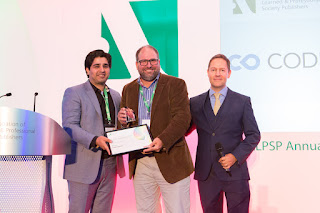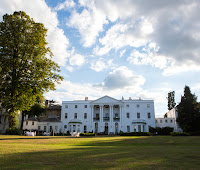In this blog, Alastair Horne, Press Futurist and social media correspondent at this year's ALPSP Conference reports on a packed few days in Windsor hearing from the scholarly publishing community.
This year’s conference once again
offered a range of perspectives from across the scholarly publishing ecosystem
on the key issues that affect us.
 |
| Keynote - Professor Chris Jackson |
Thursday’s opening keynote was given by
Professor Chris Jackson, who shared his own experiences as a researcher who has
engaged deeply with the industry, publishing more than 150 articles, acting as
editor for three journals, and co-founding the EarthArXiv preprint server. In a
wide-ranging talk, Jackson offered some advice for publishers drawn from his
experience: to be transparent about APC pricing; to offer strongly reduced APCs
to early career researchers in order to build an affinity with new authors; and
to be clear about their views on metrics. On open access, though generally
enthusiastic, he suggested that Plan S had caused concerns among academics
and might create challenges for societies who relied on income from
subscription or hybrid journals to fund their other activities.
Open access was, inevitably, a
theme that persisted throughout the conference. The panel that followed
Jackson’s talk asked how societies and publishers should ‘accelerate the
transition’. Kamram Naim shared details of the ‘subscribe to open’ model used
by non-profit publisher Annual Reviews,
which addressed the twin problems of library policies on ‘donations’ often
preventing the support of open access initiatives, and the fact that APCs don’t
work for journals that publish invited contributions from scholars, rather than
receiving submissions. Their ‘Subscribe to Open’ model, which bears some
similarities to Knowledge Unlatched’s, sees libraries receive a discount on
their journal subscriptions if they choose to participate in unlocking
initiatives: if enough do so, then that volume’s issues of the journal become
available through open access; if not, then only subscribing institutions have
access. Naim’s fellow panellist Steven Hill, Director of Research at Research
England, and architect of the new REF, insisted that the new requirement for
open access monographs would not mandate any particular model. His position was
strongly challenged, though, by the panel’s third speaker, Goldsmiths Press’ Sarah Kember, who asked why the transition to open access for monographs was
happening at all, and called for a deceleration to allow time for more
consideration of differences across the sector. Plan S, she suggested, totally
disregarded the humanities and monographs, and posed a considerable threat to
academic freedom by restricting where researchers could publish.
 |
| Panel debate on Open Access |
The following day, a further
session considered the impact of open access on library sales, strategies, and
solutions, as library directors from Europe and the US shared some insights
into their institutions’ recent cancellations of big deals. Wilhelm Widmark, Library
Director of Stockholm University, suggested that the Swedish universities’
decision to reject what he described as a ‘good’ proposed deal with Elsevier
was because it didn’t offer a sustainable route to full open access; the money
saved is being redirected towards fully open access journals. Jean François
Lutz, Head of the Digital Library at the University of Lorraine, and Adrian
Alexander, Dean of the Library at the University of Tulsa, added that their own
institutions’ decision to cancel some of their big deal contracts were prompted
by budget constraints and unsustainable pricing increases.
Friday’s opening session
considered another increasingly hot topic: customer data. Chris Leonard from
Emerald shared insights from their work in mapping user journeys in accessing
their content, and one key finding – that though a high proportion of people
who visit their site discover it through Google, the majority of those people don’t
have institutional access and so leave; people who come to the site via library
discovery services are far more likely to continue their journey further. Lettie
Conrad of Maverick Consulting spoke of the wealth of data available to
publishers, both internal – customer service records, sales reports, customer
data, market research findings, product testing and user studies – and external
– competitor analysis, discovery journeys, and usage analytics. Transforming
such data into usable information required strategic thinking and some
investment, she suggested, but it wasn’t rocket science. The third panel
member, David Hutcheson, told how BMJ had developed a strategy for using data
to inform their decisions, drive user engagement and deepen user understanding.
Working with consultants and stakeholders to create an overall plan, they
started by deepening their understanding of their existing technology and
resources and testing them to see what worked. Integrating their different
platforms to connect their data, and developing partnerships with suppliers,
the BMJ set up a small six-person data team to serve as a specialist centre of
excellence, supporting the rest of the business, automating processes and
delivering self-service reporting to enable and empower colleagues to make use
of the data produced.
The parallel sessions offered the
usual dilemma of which to attend, and though there’s too little space to
describe them all here, a personal highlight was a fascinating panel on the
digital humanities. Peter Berkery of the Association of University Presses,
Paul Spence of King’s College London, and Etienne Posthumus of Brill all discussed
recent experiments in finding modes of publishing that would support the
complex needs of this growing sector. Spence spoke of the need to fix a common
terminology for the different types of publications produced, while Berkery
talked through four marquee digital projects by university presses: Rotunda at Virginia,
Manifold at Minnesota, Fulcrum at Michigan, and .supDigital at Stanford;
Posthumus spoke on Brill’s own initiatives in labs and data.
Revenues from rights formed the
focus of the day’s final session, sponsored by Publishers’ Licensing Services: Rebecca
Cook of Wiley emphasised the need for thorough documentation governing what can
be done with content, while Clare Hodder urged publishers to invest in
metadata.
 |
| Code Ocean wins the ALPSP Awards for Innovation 2018 |
Then, at the evening’s gala dinner, the winners of two prestigious ALPSP Awards were announced: Richard Fisher was honoured for his Contribution to Scholarly Publishing over a long career, both at Cambridge
University Press and in his retirement, busier than many people’s main careers;
then the cloud-based computational reproducibility platform Code Ocean was
named the winner of the ALPSP Award for Innovation in Publishing.
The final day of the conference
was dominated by ethical questions. Professor Graham Crow of the University of
Edinburgh explored issues in research and publishing ethics, before the closing
panel session addressed ‘The #MeToo Era in Academic Publishing: Tackling
harassment and the roots of gender bias’. Femi Otitoju of the Challenge
Consultancy shared some lessons drawn from thirty years of experience working
in this area, emphasising the need to create the right working culture by
focusing on positive outcomes rather than problems – having a ‘dignity at work’
policy rather than one on harassment, for instance – and prominently
highlighting such policies through posters rather than pages buried on the company
intranet. Karen Phillips of SAGE spoke of the need for publishers to learn from
each other, while Eric Merkel-Sobotta of De Gruyter emphasised the importance
of economic arguments in convincing management of the need to address such
problems. Dr Afroditi Pina shared the results of her research into sexual
harassment and successful strategies for addressing it: the need to agree
appropriate sanctions for unacceptable behaviour, the role that public
apologies can play in such sanctions, and the importance of listening
un-defensively to those reporting harassment.
 |
| The Beaumont Estate |

No comments:
Post a Comment